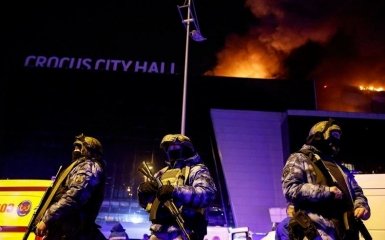Financial Times journalists, citing analysts, suggest that the Russian special services are so engrossed in the criminal war against Ukraine that they have forgotten the need to monitor security in their own country.
How the Kremlin forgot about the threat from ISIS
Journalists of the publication note that during his address against the backdrop of the terrorist attack in the Crocus City Hall shopping center near Moscow, Kremlin dictator Vladimir Putin never once mentioned ISIS.
Instead, Kremlin propaganda began to claim Ukraine's involvement in the crime.
The authors of the material assume that this was done in order to direct the anger of the Russians towards the neighboring country and divert attention from the catastrophic failure of the Russian special services.
Vira Myronova, a researcher at the Davis Center at Harvard University, noted that the terrorist attack was committed at a time when Russian special services were mobilized against the background of the long war against Ukraine.
How the FSB "slept through" the terrorist attack in the suburbs of Moscow
Journalists of "Nova gazeta. Europe" emphasize that the Kremlin's criminal war against Ukraine shifted the focus of attention of the FSB.
If by 2022 the FSB was almost entirely focused on countering the Islamist terrorist threat, then with the start of the war, most of the FSB's official statements concern Ukraine, and the arrested "terrorists" are mostly Russians protesting against the war.
An expert on Islamist terrorism, Lucas Webber, noted that Russia has long been among the enemies of ISIS.
This, in particular, was facilitated by the invasion of the occupying army of the Russian Federation on the territory of Syria, as well as the activities of the "Wagner" PMC on the territory of African countries, as well as the Kremlin's relations with the Afghan Taliban movement.
Webber notes that it is the Afghan branch of ISIS (the so-called "Wilayat Khorasan") that is one of the most active cells of the group today.
In September 2022, they organized a suicide attack on the Russian embassy in Kabul.
They also began to actively conduct their propaganda in Russian, inciting their supporters in Tajikistan and other post-Soviet countries to attack Russians.
In the doctrine of ISIS, Russia is as bad as the USA, China and Iran, — emphasizes Asfandyar Mir, a senior researcher at the US Institute of Peace




